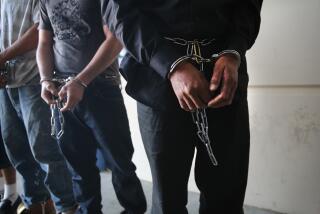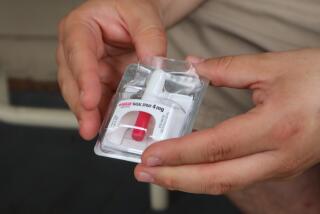Jones Urges Rapid-Response Teams
- Share via
SAN FRANCISCO — Calling California’s anti-terrorism planning inadequate, Secretary of State Bill Jones on Tuesday proposed the formation of rapid-response contingents of health professionals and National Guard troops who could be dispatched to major emergencies anywhere in the state within hours.
Jones, who is seeking the Republican gubernatorial nomination in the March primary, said Gov. Gray Davis’ response to the Sept. 11 attacks was neither comprehensive nor well coordinated.
“The state does not possess the manpower resources nor the equipment necessary to effectively respond to a significant natural disaster, terrorist attack or civil unrest,” Jones said in his 24-page plan.
Davis campaign press secretary Roger Salazar said the state has had a strong anti-terrorism plan in place since 1999, and it was activated after the East Coast terror attacks.
“It only took Mr. Jones three months and seven days to try to turn this into a political issue,” Salazar said. “The governor is going to keep doing what he has been doing since the attacks: keep Californians safe.”
Extensive Training for Members Proposed
In an address to the Public Policy Institute of California, Jones called for creation of a Homeland Security Force with about 1,000 National Guard members who would undergo extensive law enforcement training and be deployed exclusively within the state.
Although natural disasters have prepared California better than other states, he said, the health-care system has “extremely limited ability to respond to major health-related emergencies.”
Jones said a Medical Rapid Reaction Force of 2,000 doctors, nurses and other health workers could handle everything from injuries to mass inoculations in the event of nuclear or bioterrorism attacks.
He urged expansion of the medical stockpiles beyond the local and federal supplies already in the state.
“In many areas, our emergency rooms and trauma centers are inadequately funded and unable to respond to a major, full-scale terrorist attack,” he said.
The state, Jones said, should study the feasibility of using the manpower and facilities of large universities to assist with emergency medical care in a major disaster or attack. And he said the state should work with the federal government to provide smallpox, plague or anthrax inoculations to any Californians who want them.
Declaring that “we do not need to create entire new bureaucracies to secure our state,” Jones said his plan would largely involve redeploying existing state resources and federal funding.
The variables, he said, make it impossible to provide a precise cost for the plan, but 500 National Guard troops year-round would run about $30.75 million if the federal government did not bear the cost.
He said the state’s current threat assessment committee needs to be expanded to include more federal entities and others who can help identify potential targets for terrorists.
One of Jones’ opponents, former Los Angeles Mayor Richard Riordan, said he would appoint a security czar to coordinate the state’s response to terrorism. Davis has appointed a former FBI agent as his chief terrorism advisor.
Governor’s Warning About Bridges Criticized
In an apparent slap at Davis for releasing information this fall on threats against major bridges, Jones’ plan said, “The confidence of public officials has been weakened and damaged by inappropriate and inaccurate analysis and release of national intelligence data.”
He recommended creation of a bipartisan intelligence advisory committee to advise the governor.
One concern that has surfaced since the attacks, he said, is that California’s National Guard provides fewer recruitment and retention incentives than many other states.
Jones proposed that state workers who are called up for Guard duty be paid the equivalent of their full state salary. He said California Guard members should be offered tuition assistance and a state tax exemption for their Guard pay.
A Central Valley farmer by background, Jones said the state’s water supplies and agricultural products need better protection from terrorist attacks that could harm both the population and the economy.
He called for a bond issue to pay for increased security of water resources and a cataloging of state vehicles that could carry water in an emergency.
Jones said his proposals would require public support as well as legislation or other official action on state and federal levels.
“An open collaborative discussion of our civil defense needs is imperative,” he said.
More to Read
Get the L.A. Times Politics newsletter
Deeply reported insights into legislation, politics and policy from Sacramento, Washington and beyond. In your inbox three times per week.
You may occasionally receive promotional content from the Los Angeles Times.










